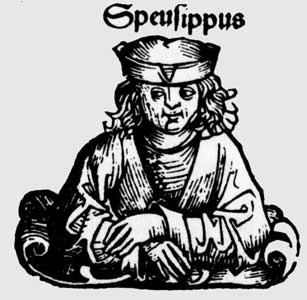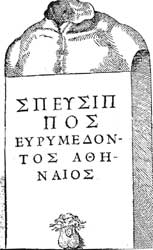.

Speusippos, Hartmann Schedel , Die Schedelsche Weltchronik, 1493
Speusippus, the son of Eurymedon was an ancient Greek philosopher, nephew and successor of Plato. He resided at Plato's academy for eight years, where he was noted for debauchery and extravagance. Plato attempted to curb him, but without effect. He died either of suicide or a wasting disease.

Diogenes Laertius:
The long account which I have given of Plato was compiled to the best of my power, and in it I collected with great zeal and industry all that was reported of the man.
II. And he was succeeded by Speusippus, the son of Eurymedon, and a citizen of Athens, of the Myrrhinusian burgh, and he was the son of Plato's sister Potone.
III. He presided over his school for eight years, beginning to do so in the hundred and eighth olympiad. And he set up images of the Graces in the temple of the Muses, which had been built in the Academy by Plato.
IV. And he always adhered to the doctrines which had been adopted by Plato, though he was not of the same disposition as he. For he was a passionate man, and a slave to pleasure. Accordingly, they say that he once in a rage threw a puppy into a well; and that for the sake of amusement, he went all the way to Macedonia to the marriage of Cassander.
V. The female pupils of Plato, Lasthenea of Mantinea, and Axiothea of Phlius, are said to have become disciples of Speusippus also. And Dionysius, writing to him in a petulant manner, says, "And one may learn philosophy too from your female disciple from Arcadia; moreover, Plato used to take his pupils without exacting any fee from them; but you collect tribute from yours, whether willing or unwilling."
VI. He was the first man, as Diodorus relates in the first book of his Commentaries, who investigated in his school what was common to the several sciences; and who endeavoured, as far as possible, to maintain their connection with each other. He was also the first who published those things which Isocrates called secrets, as Caeneus tells us. And the first too who found out how to make light baskets of bundles of twigs.
VII. But he became afflicted with paralysis, and sent to Xenocrates inviting him to come to him, and to become his successor in his school.
VIII. And they say that once, when he was being borne in a carriage into the Academy, he met Diogenes, and said, "Hail;" and Diogenes replied, "I will not say hail to you, who, though in such a state as you are, endure to live."
IX. And at last in despair he put an end to his life, being a man of a great age. And we have written this epigram on him:
Had I not known Speusippus thus had died,
No one would have persuaded me that he
Was e'er akin to Plato; who would never
Have died desponding for so slight a grief.
But Plutarch, in his Life of Lysander, and again in his Life of Sylla, says that he was kept in a state of constant inflammation by lice. For he was of a weak habit of body, as Timotheus relates in his treatise on Lives.
X. Speusippus said to a rich man who was in love with an ugly woman, "What do you want with her? I will find you a much prettier woman for ten talents."
XI. He left behind him a great number of commentaries, and many dialogues; among which was one on Aristippus; one on Riches; one on Pleasure; one on Justice; one on Philosophy; one on Friendship; one on the Gods; one called the Philosopher; one addressed to Cephalus; one called Cephalus; one called Clinomachus, or Lysias; one called the Citizen; one on the Soul; one addressed to Gryllus; one called Aristippus; one called the Test of Art. There were also Commentaries by way of dialogues; one on Art; and ten about those things which are alike in their treatment. There are also books of divisions and arguments directed to similar things; Essays on the Genera and Species of Examples; an Essay addressed to Amartynus; a Panegyric on Plato; Letters to Dion, and Dionysius, and Philip; an Essay on Legislation. There is also, the Mathematician; the Mandrobulus; the Lysias; Definitions; and a series of Commentaries. There are in all, forty-three thousand four hundred and seventy-five lines.
Simonides dedicated to him the Histories, in which he had related the actions of Dion and Bion. And in the second book of his Commentaries, Favorinus states that Aristotle purchased his books for three talents.
XII. There was also another person of the name of Speusippus, a physician of the school of Herophilus, a native of Alexandria.
Speusippus Stanford Encyclopedia
| Ancient Greece
Science, Technology , Medicine , Warfare, , Biographies , Life , Cities/Places/Maps , Arts , Literature , Philosophy ,Olympics, Mythology , History , Images Medieval Greece / Byzantine Empire Science, Technology, Arts, , Warfare , Literature, Biographies, Icons, History Modern Greece Cities, Islands, Regions, Fauna/Flora ,Biographies , History , Warfare, Science/Technology, Literature, Music , Arts , Film/Actors , Sport , Fashion --- |
Retrieved from "http://en.wikipedia.org"
All text is available under the terms of the GNU Free Documentation License

